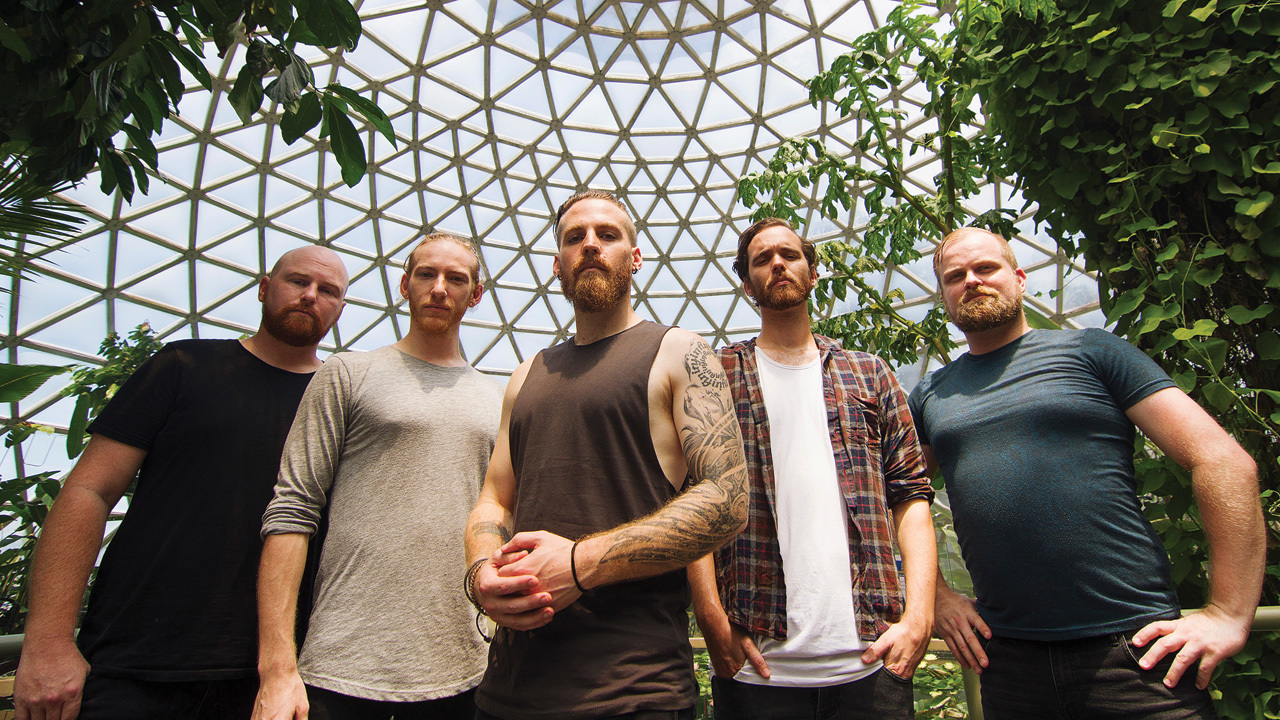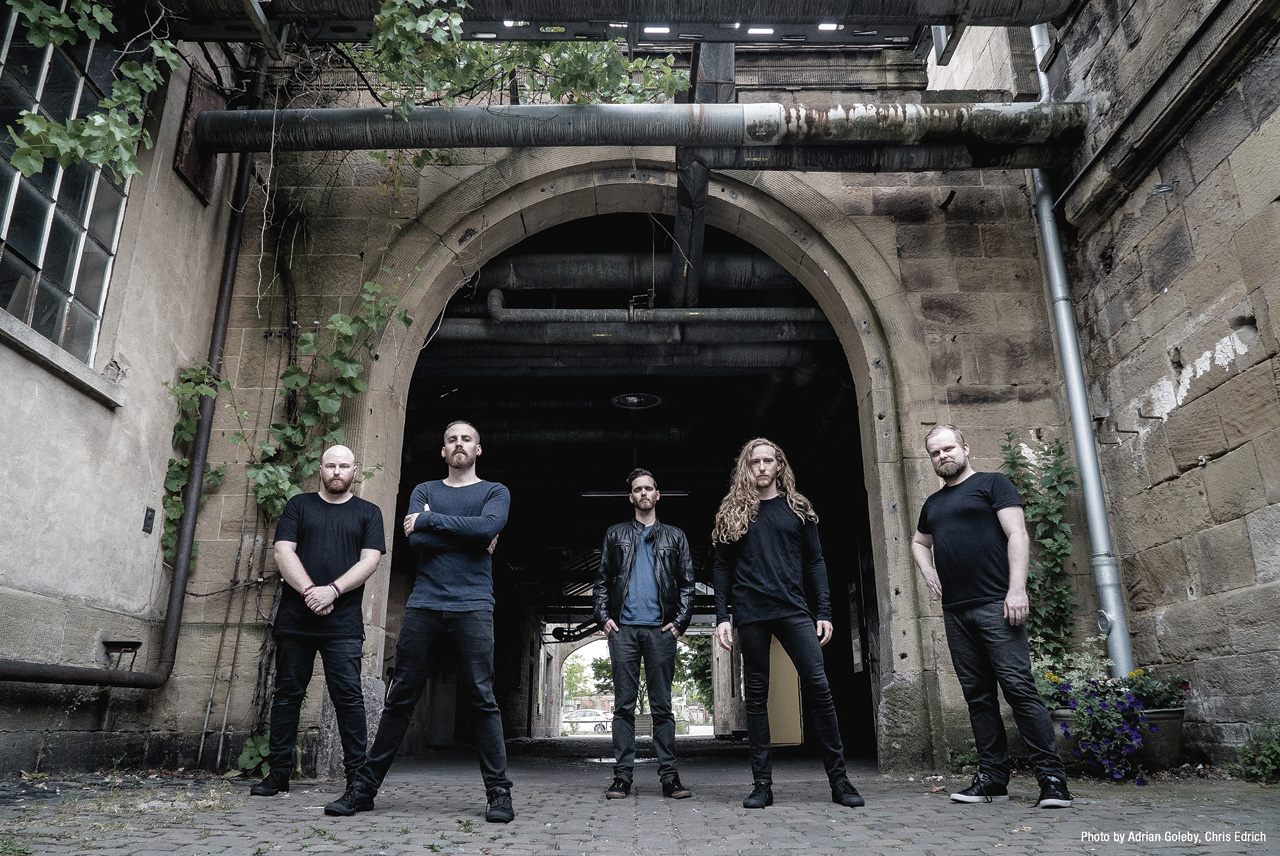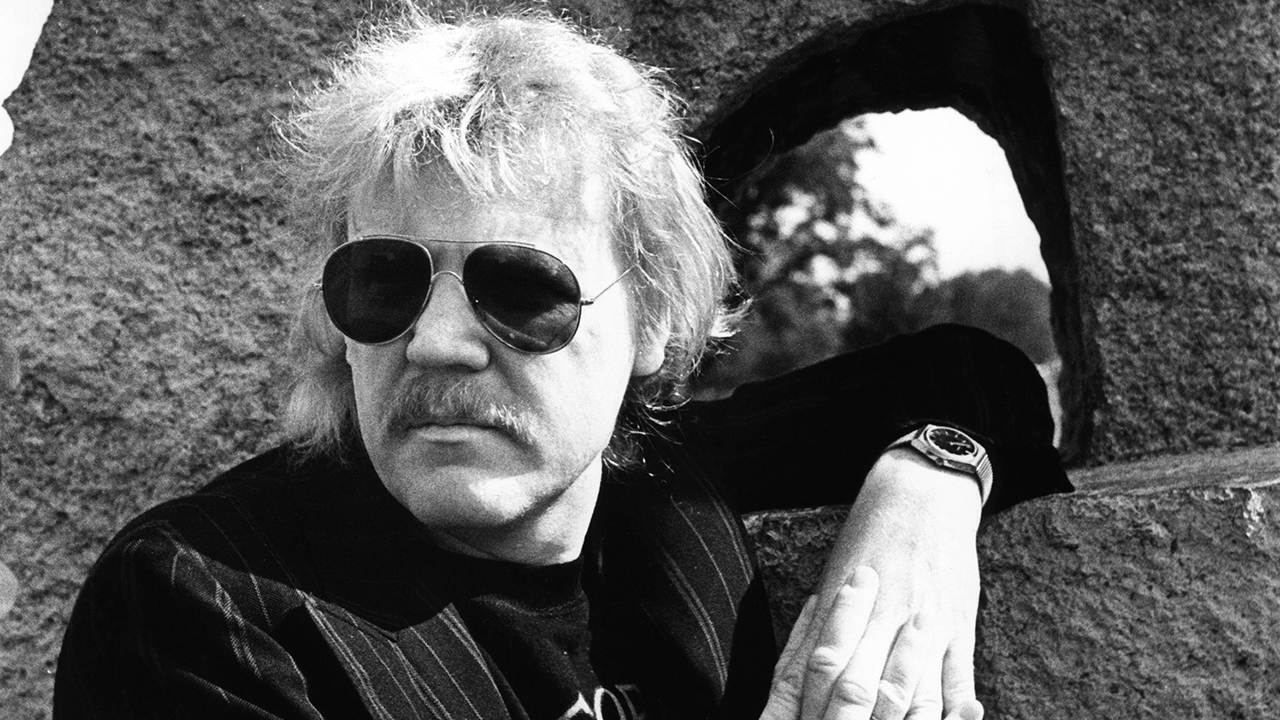"This is us at our absolute best." Caligula’s Horse and the maing of In Contact
On their fourth album In Contact, Caligula’s Horse have challenged themselves not only musically but also lyrically, with their most ambitious concept to date. Frontman Jim Grey tells us more

Modern progressive rockers around the world are finally beginning to know the name Caligula’s Horse, and the band’s profile is set to expand further this year. They began as a writing project for guitar maestro Sam Vallen in Brisbane, Australia back in 2010. He had sketched what was to become debut album Moments From Ephemeral City, and needed a strong and enigmatic frontman to flesh out his ideas in a vocal sense. Enter Jim Grey.
Modern progressive rockers around the world are finally beginning to know the name Caligula’s Horse, and the band’s profile is set to expand further this year. They began as a writing project for guitar maestro Sam Vallen in Brisbane, Australia back in 2010. He had sketched what was to become debut album Moments From Ephemeral City, and needed a strong and enigmatic frontman to flesh out his ideas in a vocal sense. Enter Jim Grey.
The pair quickly found their writing groove, and it soon became apparent that their musical and personal chemistry, and the ideas they were coming up with, were so strong that they had to take things further. They built up a tight band and released Moments… in 2011.
Subsequent years have seen the release of two more superb albums: 2013’s The Tide, The Thief And River’s End – which caught the interest of prestigious German label InsideOut, current home of Devin Townsend, Haken and The Tangent – and Bloom, which came out in 2015. Much traversing the enormous continent that is their homeland and several international sojourns followed, and now they’re ready to release their superb fourth album In Contact.
Many bands reel out the whole ‘this new album is the best thing we’ve done’ line, but Caligula’s Horse are a group who truly outdo themselves on every release. From his home in Brisbane, Jim Grey discusses the process behind their burning desire to improve on each release.
“With every album, we try to step forward from what we’ve done before,” he says. “We’ve taken what we learned from doing …River’s End and created Bloom, then taken what we learned from doing Bloom and created In Contact. So In Contact deliberately has some of the colourful sound that we developed on Bloom, but at the same time we’ve ventured into heavier and more technically complex territory than before.”

That new complexity was made possible, at least in part, due to a couple of line-up changes the band were forced to make between the release of Bloom and the creation of the new record. These changes saw them working with guitarist Adrian Goleby and drummer Josh Griffin. “We’ve got Josh in the band now, and he’s capable of just about anything!” laughs Grey.
Sign up below to get the latest from Prog, plus exclusive special offers, direct to your inbox!
Another major new challenge they took on in creating the new album was the formulation and execution of the complex and somewhat esoteric concept that runs the length of the album and infiltrates all of its lyrics and imagery.
“We sat down and nutted out a few ideas, based on a fundamental idea that I came up with, which was the concept for the universe in which it’s set,” Grey recalls. “It’s a concept where every piece of art that’s ever been created is an attempt by human beings to remember, or put their finger on, the memory of a dream that we’ve all forgotten. We’re not actively aware of it, but we all shared a dream once, and just a little echo of that is present in artists and their need to create and their inspirations, so that’s sort of the source of their inspiration.”
It’s a fairly obscure concept, especially relative to some of the sweeping, monumental themes and storylines that have imbued classic records in the past, but after much discussion, they were able to brainstorm a way of making it come to life. When the finished product is placed under the microscope, it works an absolute treat.
“That would be hard to write a concept album about if you just sat down and said, ‘I’m going to write a big epic about this…’ That’s not how I like to write,” he admits. “So when we discussed it, we settled on the idea of trying to make it personal and writing personal stories. I think the first of the songs to come out of all that was The Hands Are The Hardest from the first chapter, and that really got me into the head of that character. I decided at that stage to really get to know and understand the characters.”
There’s more new ground Grey and the band have broken on In Contact, and that’s with the inclusion of a piece of spoken word poetry called Inertia And The Weapon Of The Wall, which is sure to surprise a few people. It’s an interesting and compelling piece that’s given a life of its own with the aid of some production treatment. Grey is more than happy to talk about the origins of the piece and the motivations behind putting it on the record.
“I’ve been challenging myself to write more poetry, [to move away from] only writing lyrics for stimulus response when I feel the need to write a song,” he reveals. “I just write when I feel like writing outside the band. I’m pretty sure the body of the poem came first, and that sparked the idea of this character, Ink, from the third chapter of the album. It ended up reflecting elements of his character and where it goes in his story. I wanted to paint a picture of this city in which he lives and his disdain for it, but also his love for it, and the fact that he can see through the cracks and see how everything is connected. He, more than any of the other characters on the album, sees the connection between people and the reasons behind it. But I think he doesn’t draw the broader connection because he’s so frustrated with the state of things in the city.”
Grey has a very strong suggestion about how he feels people should listen to and enjoy this particular piece of music.
“We tried to get a full take of it, a real performance,” he remembers. “It was about the third take we did of the entire poem all at once. Then we went back and put in little whispers and sounds and different layers, vocally, and Sam did all this textured, synth-based stuff to colour the mood and capture the imagery of the situations that Ink is describing in the poem as well.
“It’s very deliberately constructed,” Grey adds, “and I would recommend that people listen to that one with headphones on to uncover all the secret stuff that’s in there.”
At the very opposite end of the spectrum is Graves, a pounding but dynamic 15-and-a-half-minute epic, which displays the full gamut of what this band are capable of and closes the album in monumental style. Originally slated to be an EP in the style of Dream Theater’s A Change Of Seasons, the band had a change of heart and decided to include it on In Contact instead. It turned out to be a long and arduous process, but the end result is truly stunning.
“Before we’d decided to make the album, Sam and I had toyed with the idea of releasing a one-track, side-length EP,” the frontman says. “It’s something we’ve never done before. Little pieces of that started taking place in Graves, and the outlet for that was Graves and we decided it was going to be an album.
“It was the one that really crushed us – Sam put everything into that song. For a good number of weeks, finishing that thing off, he was chiselling away, spending hour after hour trying to get this thing as good as it can be. We both ended up with writer’s block for a month or two afterwards!”
Grey feels that Caligula’s Horse have really hit the mark with In Contact – it’s the album they have been working towards for their whole career so far. It’s an album that doesn’t fit comfortably with the current trends in heavy progressive music, but still has broad appeal to fans of the style.
- Caligula's Horse - In Contact album review
- Hot New Band: Caligula's Horse
- The TeamRock+ Singles Club
- TeamRock Radio app back on Apple’s app store
“I feel like it’s a step forward for current progressive metal,” Grey states confidently. “That feels like I’m big-noting myself a lot, but basically what I mean by that is it’s not part of that djent movement, not part of what’s expected of progressive metal right now. This is us at our absolute best, and discovering a unique voice that we have in the progressive metal scene. It’s something very special.”
The band recently returned from a highly successful tour of Europe and the UK, which saw them play a number of major festivals and share the stage with the likes of Opeth, Anathema and Pain Of Salvation, as well as headlining shows of their own. The release of the new album sees them undertaking an extensive run of their homeland towards the end of September and early October.
They plan to take a breather over Christmas, but aim to be back on the road in the new year, and they’ll possibly even follow up In Contact with some more new music.
“Sam and I have discussed continuing writing straight away and rolling into some new material, since we seem to be on a roll,” Grey says. “I think as far as the live world is concerned, we’re going to be on – I’m not going to say ‘hiatus’ because that suggests a long time – but really we’re not going to be doing anything for a little while on the back of the fact that Sam has to finish his PhD.
“But there’s a lot of stuff happening; we’re not disappearing. Sam and I are going to continue writing and hopefully we’ll be back maybe in the first half of next year for more European shows and more Australian shows. We’ll just have to wait and see what happens there.”
Grey is very keen to give fans in Europe, the States and other rock-loving territories who may be longing for Caligula’s Horse to visit their shores an understanding of just what it’s like to be a burgeoning rock act based in what is inarguably one of the most isolated rich Western nations on the planet.
“There’s simply no way we could have done this recent European tour without help from the Australian government,” he says. “We lost a great deal of money on our first European tour, because of all the thousands and thousands of dollars that goes into getting a band of our size there. This time round, we took advantage of some grants that were available, and things were timed really well.
“We were fortunate enough to make a positive impact at the shows, and their size was enough to warrant a lot of merch sales that helped us along as well. Even just getting there would have required help. Hopefully over the next couple of years it gets to the point where it’s a little less earth-shattering to leave the country.”
At the same time, that isolation also has its advantages, giving the diverse range of bands that are currently coming out of Australia such a distinctive sound, attitude and quality.
“I feel like it actually comes as a blessing and a curse,” Grey tells us. “I bitch a lot about the isolation of Australia, but I feel it’s unwarranted sometimes because we’re not having that close quarters competition with people trying to one-up each other in the same scene. So in that way I feel there’s a lot of unique sounds coming out of Australia that the world is really excited about and grateful for.
“We have a unique voice here, and that’s the benefit of being in Australia. Obviously it comes with a great deal of expense to spread that everywhere, but I’m grateful for it.”
